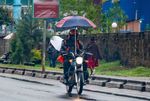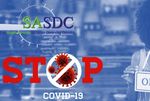Employment and Skills for Development in Africa (E4D) - Quarterly Update - GIZ
←
→
Page content transcription
If your browser does not render page correctly, please read the page content below
December 2020
Employment and Skills for Development
in Africa (E4D) – Quarterly Update
Dear readers, About E4D
This Quarterly Update, the last one for 2020, details how the E4D programme has adapted The Employment and Skills for Develop- Funding: German Federal Ministry for Eco-
to cushion the effects of the Covid-19 pandemic, and highlights new projects and activities. ment in Africa (E4D) programme aims at nomic Cooperation and Development (BMZ),
bringing people into jobs and improving European Union (EU), Norwegian Agency for
Despite the lockdowns and other restrictions enterprises in South Africa, and our efforts employment situations in six countries: Development Cooperation (Norad), Foreign
on people’s movement, the E4D team, which to ignite cross-sectorial cooperation to Ghana, Kenya, Mozambique, South Africa, Commonwealth and Development Office
I joined in November as Programme Director, support graduates of Technical Vocational Tanzania and Uganda. Through cooperation (FCDO), Korean International Cooperation
is committed to continuing our mission of Education and Training (TVET) in Tanzania. with private and public sector partners, Agency (KOICA), and the companies
increasing sustainable employment in our E4D is implementing development projects Quoniam Asset Management, Rio Tinto,
partner countries. The past achievements of Finally, this quarter’s Project Insight section in different sectors, mainly targeting dis- Royal Dutch Shell, Sasol and Tullow Oil.
this team, and the overall social impact E4D features a unique intervention, implemented advantaged groups like women and youth.
already has, make me confident that we by E4D Kenya, to empower people with dis-
can achieve our goals despite this unprec- abilities through demand-driven skills train- Timeline: 2015–2023
edented, challenging reality. ing in the field of IT security.
Impact targets:
The following pages introduce some of the I am truly excited and proud to join E4D and 1. Boost the number of people employed
ways we have already responded to the lead the programme in the coming years. in the six partner countries by 55,000
Covid-19 pandemic, including creating We look forward to further cooperation with 2. Improve the employment situation of GH
Tourism Skilling Clusters in Uganda, in- our existing partners, to new partnerships 210,000 people by raising incomes, secur-
UG KE
forming rural farmers in Mozambique and opportunities, and to making a great ing jobs and improving working conditions
on virus preventive measures, and train- impact in 2021. 3. Enhance business capacity of local 38,000 TZ
ing Ghanaian tailors and dressmakers enterprises, thereof 3,000 small and
to produce facemasks. Also featured are Please stay healthy and safe, medium-sized enterprises (SMEs) and MZ
reports about our new initiative to empower Katja Röckel, E4D Programme Director 35,000 micro-sized enterprises
black-owned small- and medium-sized 4. Promote up scaling of 30 successful
development projects and models ZA
Implemented by: jointly funded by:
For further information, please contact e4d@giz.deEmployment and Skills for Development in Africa (E4D) Quarterly Update – December 2020 2/6
Regional Impact
of E4D Measures
As of June 2020
0 10 k
32,326
20 k
people brought into decent jobs
45% youth
35% women
70,629
people increased
their income
on average by
248%
0 10 k 20 k 30 k 40 k 50 k 60 k
32,679
0 10 k 20 k
53%
of TVET graduates in Kenya, Uganda,
People improved their Tanzania and Mozambique who completed
working conditions E4D activities gained employment
More than
€24,000,000
have been leveraged from the
private and public sectorsEmployment and Skills for Development in Africa (E4D) Quarterly Update – December 2020 3/6
Country Highlights
So far, 52 dressmakers and tailors have safety regulations; boda boda accidents
been trained on facemask production, caused 611 deaths in 2019 and more than
pattern cutting, machining, pressing and 1000 people were seriously injured.
quality control; and most crucially – on
compliance with international standards. In October 2020, the E4D programme
launched a project that aims to improve
The training was provided in the commu- the employment and economic situation of
nities where GSR’s two gold mines are 3,000 boda boda operators in Kenya’s coast,
located, in Ghana Western-North region. eastern and central regions. The project,
The Ghana Standards Authority will be which is implemented in collaboration with
assessing the quality of the facemasks the Co-operative Bank Foundation, includes
Ghana produced in these communities, and as Kenya training on business skills, financial literacy,
soon as they are certified, they will be able digital solutions and road safety.
Training dressmakers and tailors to bid for international contracts in face- Promoting job creation in the
on mass production of high quality mask production. boda boda industry This project will contribute to increased em-
facemasks ployment of youth in the boda boda industry
E4D is encouraging and supporting indivi- Motorcycle taxis (boda boda) play a sig- as operators or mechanics, increased in-
In response to the pandemic, the E4D pro- duals and companies who benefited from nificant role in Kenya’s transport sector, comes and better working conditions for all
gramme in Ghana adapted one of its projects the training to pursue other economic op- with an estimated 1.2 million operators boda boda operators, and improved access
to address an urgent need. Originally, the portunities and expand their businesses. ferrying 14.4 million passengers every to business opportunities for micro-entre-
“Retaining and Enhancing Shared Values Furthermore, due to the uncertain future day. This makes the boda boda industry preneurs in the boda boda industry. Further-
through Skills Development” project, imple- of the coronavirus pandemic, the training an important employer and an agent of more, by supporting operators to obtain
mented in partnership with the Canadian on facemask production will become an economic development. driving licenses and insurance, the project
gold mining company Golden Star Resources integral part of the project. will lead to better overall road safety.
(GSR), aimed at upgrading the overall skills But boda boda operators often struggle
and expertise of dressmakers and tailors, For further information, please contact to earn a sustainable income, mainly due For further information, please contact
so they could take advantage of opportuni- john.duti@giz.de to low access to information and insuffi- thomas.jaeschke@giz.de
ties and have sustainable incomes. In July cient capacity development opportunities.
2020, a new component was incorporated Lacking funding to obtain driving licences
into the project’s activities: training for pro- and road insurance, many boda boda ope-
duction of facemasks. rators don’t properly observe road andEmployment and Skills for Development in Africa (E4D) Quarterly Update – December 2020 4/6
Country Highlights
sensitized on the disease, symptoms, how To address this challenge, the E4D pro-
to prevent and where to get medical assis- gramme launched in September 2020,
tance in case of signs or a positive test. in collaboration with the South African
The training, which included a theatrical Supplier Diversity Council (SASDC) and
play that was conducted by a drama group, the private sector, a project that promotes
emphasised the importance of practicing supplier diversity as a business strategy
social distancing and maintaining basic for achieving competitiveness and long-
hygiene standards. Using a play to transfer term sustainability. The focus of the project
information was essential because many is on supporting enterprises to achieve
of the participants have low literacy levels. statutory compliance, in order to increase
Apart from social distances and hygiene their chances of successfully applying for
Mozambique measures the play also focused on the issue South Africa the government’s financial relief funding.
of good nutrition as a basis for a healthy
Farmers trained on Covid-19 body and a functioning immune system. Building resilience of black-owned SMEs The first step of this one-year project has
preventive measures been an outreach campaign to attract SMEs,
Participants in the training received hand- In light of the negative impact that the an assessment process, and the selection
Since nearly two thirds of Mozambique’s made face masks made of capulana, a Covid-19 lockdown has had on small- of 600 black-owned SMEs to participate.
population live in rural areas, one of the traditional fabric in the region. In addition, and medium-sized enterprises (SMEs), Beyond support in the funding application
main challenges in addressing the pande- E4D distributed to villages in Inhambane the South African government is collabo- process, the selected SMEs will be provided
mic has been spreading information about Province hygiene equipment to stimulate rating with the private sector to provide a with coaching to improve business resilience
Covid-19 and about preventive measures hand washing, as well as posters with es- variety of support mechanisms. However, and enhance their sustainability while they
throughout the country, to ensure that people sential information on Covid-19 to further for enterprises to access these support wait for the market to recover and hope-
can protect themselves. Recognising this inform the local population. mechanisms, they require a minimum fully return to normal.
challenge, the E4D programme has respond- level of statutory and industry compliance,
ed by providing beneficiaries of its activities For further information, please contact and many South African SMEs – including For further information, please contact
with relevant, updated infomation. alexandra.oppermann@giz.de most of the historically disadvantaged gavin.watson@giz.de
black-owned enterprises – lack sufficient
In July 2020, a total of 309 households in knowledge on industry standards.
the districts of Jangamo and Inharrime
of Inhambane Province were trained andEmployment and Skills for Development in Africa (E4D) Quarterly Update – December 2020 5/6
Country Highlights
In September 2020, E4D set up a SDWG The TSCs will be established in collaboration
webinar on “Strategies and resources for with leading tourism companies, asso-
post training support to TVET graduates” ciations and experienced local tourism
– which had 35 participants. The main pre- professionals (“tourism champions”) across
senter was the Executive Secretary of the Uganda. Through these TSCs, more than
National Economic Empowerment Council, 1,100 people will be trained for jobs that
Mrs Beng’i Issa, who introduced the SANVN have been identified by the industry as on
scheme, a governmental plan to support demand: hospitality staff, driver guides,
small- and medium-sized enterprises in tourism entrepreneurs and site guides.
the industrial sector that lack business The training will be based on the Ukarimu
skills or access to capital and markets. curriculum, which offers a combination
Tanzania The SANVN scheme is implemented in col- Uganda of short practical courses with extensive
laboration with VETA, Azania Bank, Small work-based learning opportunities to equip
Igniting cross-sectorial cooperation Industries Development Organisation and Equipping tourism businesses to thrive trainees with the knowledge and market
to support graduates of TVET other stakeholders, and is expected to in the Covid-19 recovery period awareness required to kick-start their
create at least 1,385 direct employment career. It is expected that as a result of
Strengthening cooperation between the opportunities. The pandemic has led to the closure of this training about 700 people will secure
private sector and the public sector is a borders and has significantly hurt the employment in tourism and hospitality or
key goal of the E4D programme in Tanzania, E4D’s SDWG webinar also included pre- tourism industry; bookings were cancelled, improve current working conditions.
as part of its efforts to improve the country’s sentations about USAID’s Advancing travel agencies shut down, and national
Technical and Vocational Education and Youth programme and the International parks emptied from visitors. It is hoped TSCs will also provide business development
Training (TVET). In line with this goal, E4D Youth Foundation’s ViA project, as well as and expected that by the middle of 2021 support to tourism companies and entre-
has been organising Skills Development open discussions between participants. the pandemic will slow down and the Ugan- preneurs, focusing on issues that have be-
Working Groups (SDWGs), which bring The meeting opened doors to increased dan tourism sector can start to recover. come significant because of the Covid-19
together organizations that are active in collaboration across sectors; for example, To strengthen the sector when it rebounds, pandemic. This E4D project will be imple-
skills development in Tanzania, including a representative of the KCB Foundation the E4D programme plans to set up Tourism mented in collaboration with the Eye Opener
the Vocational Education and Training expressed interest in integrating VETA Skilling Clusters (TSCs) that will provide Initiative (EOI) and with funding from the
Authority (VETA), donor organisations and graduates in its activities and providing Ugandan youth, especially women, with digital travel marketplace Booking.com
United Nations agencies. them with post-training support. relevant skilling opportunities for careers and other private sector stakeholders.
in the sustainable tourism and hospitality
For further information, please contact sectors. For further information, please contact
kabongo.mbuyi@giz.de julia.mager@giz.deEmployment and Skills for Development in Africa (E4D) Quarterly Update – December 2020 6/6
Project Insight: Empowering persons with disabilities
Closer look into through demand-driven skills training
an E4D initiative There are an estimated four million people with disabilities in Kenya, and only 1% of them
are employed. Low levels of education and lack of access to information are the main
challenges restricting employment opportunities for persons with disabilities.
The Kenyan government has invested in The objective of this E4D initiative – Building
supporting people with disabilities into resilient IT skills supply through demand
employment, mainly through the Disability generated ecosystems (BRIDGE) – is to is to
Act of 2003, which aims to ensure such increase representation of young women
people have access to rehabilitation as well and men with disabilities in demand driven
as equal rights and opportunities. A Natio- formal employment.
nal Development Fund for Persons with
Disabilities was established in 2010 to fur- The project is implemented in partnership
ther facilitate employment of the disabled, with Sightsavers, an international NGO advo-
provide income maintenance, and improve cating for people with visual impairments
educational, training and rehabilitation and other disabilities, and in collaboration
institutions. with the United Disabled Persons of Kenya.
Private sector actors involved in this project
In line with the government’s efforts, the include the consulting firm Three Talents
E4D programme launched in November 2020 Advisors LLC and the Kenyan communication
a collaborative project with private and company Safaricom, which has guaranteed
public sector partners, to provide demand- providing internships to trainees.
oriented training courses in the field of
IT-Security to young people with disabilities. Overall, 40 youth with disabilities, of whom
at least 14 women, will complete a training
The courses utilise the CISCO Certified that includes technical up skilling, a 3-month
Network Associate curriculum, and are internship and support into employment.
complemented by the “Skills to Succeed It is expected that at least 60% of the youth
Learning Exchange” training modules, benefiting from this E4D project will tran-
© Sightsavers 2017
which – developed by the consulting firm sition into employment. Furthermore, the
Accenture’s – cover STEM skills (science, project will generate and capture lessons
technology, engineering and mathematics). learnt that will inform the establishment of
further activities to support people with dis-
abilities in Kenya and throughout the region.You can also read



























































